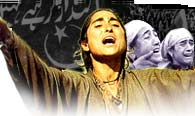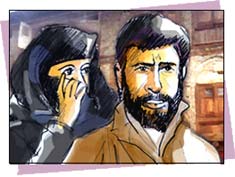

 |
 |
|
HOME | NEWS | SPECIALS | BLOOD IN THE SNOW | BITTER MEMORIES

Nine years of life on the run and a marriage taught Khurshid that blood is no solution to Kashmir Everyone in Kashmir was a militant when I joined the Hizbul Mujahideen in 1990. I didn't dwell on why there were so many militants at that time. But when I thought of it later, I arrived at the conclusion that it was the government that laid the ground for such a situation. There were a lot of atrocities. And I felt, maybe we could get azaadi soon. I didn't have to cross over to Pakistan for training. Camps were being run right here in the valley. In about 4, 5 days they taught us how to use the gun. I have lost count of the number of times I have fired and been fired upon. I will tell you how it is to feel the gun in your hand. When you fire the first time you feel uncomfortable. But after that you like the idea of firing. You enjoy it. No, you don't feel frightened during an encounter. You also have a gun in your hand. You are also firing. I remember one incident. That day nobody fired. Nine of us were sheltering in a house on the outskirts of Anantnag town. The next morning there was an army operation. They cordoned off the village and started searching. Finally they came to the house we were hiding. When they realised that we were inside, they told us to come out. We refused. We stationed our guns by the windows and got ready. When they saw that we were ready to kill and die, you know what they did? They let us go. They made way for us to escape! By 1994 there were strong crackdowns. All the forces were here. The army, CRPF, police, BSF... We used to move only in the night. In small groups, always armed: gun saath hamesha. It would be hidden under our pheran (a loose-fitting coat). The only time we left the gun behind was when we had to go to Kupwara to pick up new weapons that had come from across. I would go with 4, 5 men by vehicle. We would walk back all the way to Anantnag (over 100 km by road) from village to village. In about 20 days we would be back with the cache. We would reach a house by around 9 in the night. The next evening we would leave that place. We would tell the people in house not to move out of the house... The people weren't co-operative on their own. But we had guns. And at gunpoint, they would have even helped the armywallahs. We got everything we wanted at gunpoint. Whoever has a gun, he will get everything he wants. Till 1996 the situation was very bad. We were always on the run. There were powerful crackdowns and militancy was crushed. By 1997 things eased up. Slowly militancy started picking up again. I am married, yes. It is two years now. When we got married I was a militant. I have taken shelter in her house many times. We met and then I went back again... and we got married. She is very young, much younger than me. She changed my mind. It was she who brought me to surrender. She spoke to the police and arranged it. I have seen that blood is not the solution. I was the HM's district administrator (at par with the district commander) for Anantnag when I surrendered. It is over nine months now. I have remained under police protection. I want to escape from the valley. I want the police to send me out to Delhi or Bombay... No, I do not want to join the Ikhwanis (a group of surrendered militants who are fighting the movement alongside the security personnel now). It is better to go back to militancy than join them. They are the ones responsible for boosting militancy here. I have left the gun once and for all. I would consider Kashmir liberated when I see an end to the violence here. As for me, I would consider myself a free man if I manage to leave the valley alive. Interviewed by Chindu Sreedharan
The Kashmiris
The Lawmen |
|||||||||||||||||||||||||||||||||||||||||